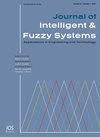面向移动边缘计算的任务卸载联合优化策略
IF 1
4区 计算机科学
Q3 COMPUTER SCIENCE, ARTIFICIAL INTELLIGENCE
引用次数: 0
摘要
移动边缘计算中的卸载策略是研究的热点,但现有的边缘卸载策略难以处理多用户密集型任务调度问题,导致网络资源利用率不高。因此,这使得最终用户的体验质量远远不能令人满意。针对这一问题,本文提出了一种由反向传播神经网络和遗传算法组成的新型联合卸载策略。首先利用遗传算法对反向传播神经网络的学习误差进行优化,然后利用反向传播神经网络对系统能耗和响应延迟进行联合优化。在长期总费用约束下,联合策略可以实现对最优解的搜索,从而产生更优的计算卸载结果。与那些只致力于减少最终用户响应延迟的方法不同,这项工作考虑了系统中的总管理成本,从而为应用程序服务提供商提供了更高效的服务。多个仿真结果表明,该策略不仅可以降低移动边缘计算系统的平均响应延迟,而且可以保持较低的平均能耗。本文章由计算机程序翻译,如有差异,请以英文原文为准。
Joint optimization strategy of task offloading to mobile edge computing
Offloading strategies in mobile edge computing are hot research, whereas, existing offloading strategies at the edge hard handle the issues of multi-user intensive task scheduling, resulting in the poor utilization of network resource. Therefore, this makes the quality of experience for end users far from satisfactory. To address this, this paper proposes a novel joint offloading strategy consisting of the back propagation neural network and the genetic algorithm. Firstly, using the genetic algorithm optimizes the learning error of the back propagation neural network, and then energy consumption in the system and response delay are jointly optimized by the back propagation neural network. Under long-term total overhead-cost constraints, the joint strategy can achieve the search of the optimal solutions to generate superior calculated offloading results. Unlike those approaches devoting into reducing response delay only for end users, this work takes account into the total overhead-cost in the system thereby affording more efficient for application service providers. Multiple simulation results indicate that the proposed strategy can not only reduce the average response delay of the mobile edge computing system, but also remain a low average energy consumption.
求助全文
通过发布文献求助,成功后即可免费获取论文全文。
去求助
来源期刊

Journal of Intelligent & Fuzzy Systems
工程技术-计算机:人工智能
CiteScore
3.40
自引率
10.00%
发文量
965
审稿时长
5.1 months
期刊介绍:
The purpose of the Journal of Intelligent & Fuzzy Systems: Applications in Engineering and Technology is to foster advancements of knowledge and help disseminate results concerning recent applications and case studies in the areas of fuzzy logic, intelligent systems, and web-based applications among working professionals and professionals in education and research, covering a broad cross-section of technical disciplines.
 求助内容:
求助内容: 应助结果提醒方式:
应助结果提醒方式:


